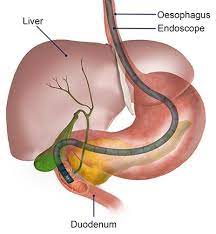-
drpvashistha@gmail.com
- +91 9004229819
Gastroscopy (OGD) in Mumbai, Navi Mumbai
Gastroscopy, also known as OGD (Oesophago-Gastro-Duodenoscopy), is a minimally invasive procedure that allows a gastroenterologist to examine the lining of the esophagus, stomach, and duodenum using a flexible tube with a camera. In Mumbai and Navi Mumbai, Dr. Purushottam Vashishta stands out as a leading gastrologist renowned for his expertise and patient-centric approach. With extensive experience and advanced techniques, Dr. Vashishta ensures precise diagnosis and effective treatment of gastrointestinal conditions. Patients can trust his practice for comprehensive care and personalized attention. Whether for routine screenings or complex cases, Dr. Vashishta provides compassionate care and strives for optimal patient outcomes.
Gastroscopy Procedure
At Dr. Purushottam Vashishta's clinic, gastroscopy procedures are conducted with utmost precision and care. Our clinic offers a comprehensive range of services to address various gastrointestinal concerns.
- Initial Consultation: Patients receive a thorough evaluation and discussion of their medical history and symptoms to tailor the procedure to their needs.
- Preparation: Clear instructions are provided to patients regarding fasting and any necessary medication adjustments before the procedure to ensure accurate results.
- Procedure: Gastroscopy is performed using state-of-the-art equipment and techniques, ensuring minimal discomfort and maximum effectiveness in examining the upper gastrointestinal tract.
- Analysis and Diagnosis: Following the procedure, Dr. Vashishta meticulously analyzes the findings to provide an accurate diagnosis and personalized treatment plan.
- Follow-up Care: Patients receive comprehensive post-procedure care and follow-up appointments to monitor progress and address any further concerns.
Benefits of Gastroscopy
Gastroscopy offers several benefits for both diagnostic and therapeutic purposes:
- Accurate Diagnosis: Gastroscopy allows direct visualization of the upper gastrointestinal tract, enabling precise diagnosis of conditions such as ulcers, inflammation, and tumors.
- Early Detection: It facilitates the early detection of abnormalities, including pre-cancerous lesions, leading to timely intervention and improved treatment outcomes.
- Minimal Discomfort: Compared to traditional diagnostic methods, such as barium studies, gastroscopy causes minimal discomfort to patients and offers quicker results.
- Therapeutic Intervention: Gastroscopy enables therapeutic interventions during the same procedure, such as biopsy sampling, removal of polyps, and control of bleeding, reducing the need for additional invasive procedures.
- Patient Safety: As a minimally invasive procedure, gastroscopy carries a lower risk of complications and ensures patient safety, making it suitable for a wide range of individuals.
Overall, gastroscopy is a valuable tool in gastroenterology, providing significant benefits in diagnosing and treating various gastrointestinal conditions while prioritizing patient comfort and safety.

